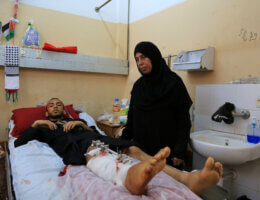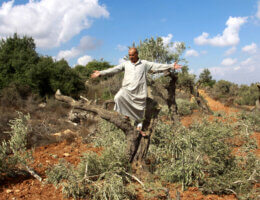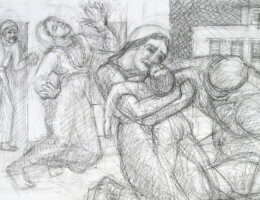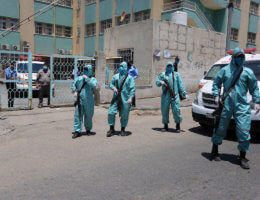“Can you kindly publish the attached stories if I die?” This is what we have been hearing from the young writers we work with from Gaza in the We Are Not Numbers project.
ADL, you do not speak for “The Jewish People”. Organizations that deem Palestinians as inherently threatening to Jews, solely because of who they are as human beings, do not represent a growing number of Jews who cannot tolerate the disinformation surrounding the mythology of the State of Israel.
Israel’s steady lurch to the right is a predictable outcome for a country founded on Jewish supremacy and discrimination against Palestinians.
This election could also be viewed as the outcome of longstanding antidemocratic forces, an inheritance from fascistic leaders like Vladimir “Ze’ev” Jabotinsky, rabbis like Meir Kahane, the unwillingness of sequential Israeli governments (left to right) to control a violent and rabid settler movement, and even the consequences of the Zionist movement itself which preached not only Jewish nationalism, but Jewish supremacy.
A controversy at the University of Washington over donor efforts to stifle scholarly work critical of Israel raises serious questions about the role of money and academia.
Campaigns to censor medical journals’ reports on the consequences of Israeli persecution of Palestinians have been sadly successful over the years, but there are signs, even at the Lancet, which has caved to censors before, that the truth is breaking through. A recent Lancet conference included a broad range of topics from environmental degradation to mental health in Palestine. The existence of these presentations is both normative in the medical world and somewhat revolutionary, given the frequent suppression of health information from occupied Palestine.
We can expect an unprecedented surge of COVID-19 in Gaza in the coming weeks and a severely damaged health care system and exhausted health care workers unable to cope adequately. Prior to the bombing, 99% of the COVID-19 virus circulating in Palestine was from the highly contagious British Variant B.1.1.7. An estimated 5% of Palestinians in the West Bank and Gaza had been vaccinated and mask use during Ramadan was lax. The positivity rate for coronavirus in Gaza was around 30% three weeks ago.
The New York Times runs “hasbara” or Israeli propaganda about coexistence in Haifa, including humans with wild boars. But Alice Rothchild writes that boars are actually a tool of occupation: Jewish settlements outside Nablus frequently blocked access to the local villages, burned their farms and olive trees, and raised wild pigs that they released into Palestinian farms.
Palestine Writes Literature Festival was an exhilarating relief from the pandemic. Writers including Naomi Shihab Nye, Ibtisam Barakat and Ghada Karmi spoke of indigeneity, dispossession, erasure, settler colonialism, oral history, collective memory, the right of return, Palestinian queerness, radical feminism, and the burning need to explore and document all of this in art, film, and writing.
Authors in the Lancet say Israel must lift “closure” on Gaza because insufficient amount of equipment needed to treat COVID-19 in the occupied Palestinian territory (87 intensive care unit beds with ventilators for nearly 2 million people and a paucity of personal protective equipment) is compounded by poor public health conditions: a water and electricity crisis, rampant poverty, and a high population density.
The pandemic has exposed the degree to which structural racism and cross generational trauma have public health consequences. From childhood to adulthood, people of color are at risk for stress related illnesses: hypertension, heart disease, diabetes, obesity, and heart disease. Now that list includes COVID-19.









